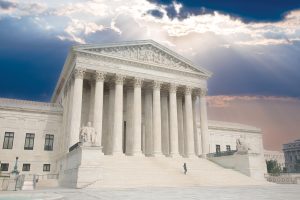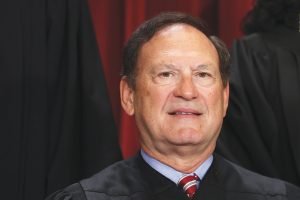
“The Christian Nationalist Right Keeps Winning,” a National Public Radio Politics Podcast episode headlined one week after the U.S. Supreme Court overturned Roe v. Wade in June 2022, casting aside federal protections of abortion rights and allowing extremist-led states to openly criminalize personal freedoms. “[H]ow does the Christian right keep securing political wins even as the share of like-minded Americans dwindles?”
How, indeed?
Prior to the mid-20th century the Supreme Court, comprised only of white men and primarily of Protestants, rarely addressed religious issues. During that time, the court steered clear of interfering with state breaches of church-state separation — infringements including devotional Bible reading and sectarian prayer in public schools — perceiving the federal Bill of Rights applicable at the national level only. Not until Cantwell v. Connecticut (1940) did the court pair the religion clauses of the First Amendment with the individual rights-oriented 14th Amendment’s Equal Protection Clause to protect the religious rights of minorities. In particular, the ruling granted a religious minority (Jehovah’s Witnesses) the right to publicly distribute religious literature.
Three years later in West Virginia State Board of Education v. Barnette, Jehovah’s Witness children attending public schools won the right to abstain from mandatory recitation of the Pledge of Allegiance, a violation of their religious faith. Four years afterward in 1947’s Everson v. Board of Education decision (which dealt with public money funding buses to private religious schools), the Supreme Court invoked Thomas Jefferson’s 1802 “wall of separation between church and state” metaphor as summarizing the intent of the Establishment and Free Exercise religion clauses of the First Amendment. The metaphor originated with early Baptist and Rhode Island founder Roger Williams, who in 1640 demanded the cessation of colonial theocracies, insisting that a “wall of separation” should be constructed between church and state, the grounding principle upon which the Rhode Island colony was established.
Concurrently in 1948 in Shelley v. Kraemer and McGhee v. Sipes, the Supreme Court sided with the National Association for the Advancement of Colored People (NAACP) in determining that the Fourteenth Amendment’s Equal Protection Clause prohibited state courts from enforcing racially restrictive property contracts. These religious and racial freedom rulings paved the way for the striking down of government-sponsored prayer in public schools, and for civil rights for Black and other minority Americans. White Protestant dominance reeled.
As federal legislation and court rulings lifted freedom’s tide for religious and racial minorities, one young Black man — formerly harboring a hatred of racial injustice – turned around and swam the other way. His growing disdain for government social justice programs fueled a contrarian rage against freedom’s march.
Many years later that once-young man wrote his story. By then Clarence Thomas was a justice on the Supreme Court. Sitting atop the nation’s supreme lawmaking body, Thomas had an ax to grind, a “philosophy of life” that “came from biblical sources” channeled by his grandfather, according to his autobiography, My Grandfather’s Son.
Thomas’s grandfather had been a stern disciplinarian, frequently beating him in an effort to instill perceived biblical values, including hard work and self-reliance. Molded by his harsh father figure, Thomas became “a man whose career as a judge is a study in brutalism,” observed The Atlantic’s Michael O’Donnell, “by far the most conservative justice on a very conservative Court.” A far-right Catholic, Thomas was the beginning of the Supreme Court’s transformation from an increasingly pluralistic-minded Protestant majority to a Christian Nationalist Catholic majority.
Long contending that the First Amendment’s Establishment Clause should not apply to the states, Thomas believes that constitutional separation of church and state should be abolished and states allowed to establish their own religions. He seemingly envisions a disunited States of America led by theocrats who will punish women, LGBTQ+ persons, non-Christians and other minorities. And, in fact, as Americans United for Separation of Church and State has reported, some state governments in recent years have passed legislation in violation of church-state separation, discriminating against persons of whom they disapprove. Frequently AU has taken legal action against those constitutional infringements.
Brushing criticism aside, Thomas pursues his anti-constitutional theocratic agenda with evangelical fervor, believing that his battles against critics are “at bottom spiritual, not political.” Citing the Bible, Thomas considers himself a martyr for Christ: “Therefore I take pleasure in infirmities, in reproaches, in necessities, in persecutions, in distresses for Christ’s sake: for when I am weak, then I am strong.” Yet in Thomas’s own Bible, Jesus in the gospels taught his followers not to force religion on others, nor to exercise privilege, power or dominance over others.
Fellow Christian Nationalist Supreme Court Justice Samuel Alito is also at odds with the inclusive, social justice-oriented teachings of Jesus in his Bible. In his false telling, white Christian males are persecuted in America because they are not allowed to have dominion over minorities. “To read his opinions is to inhabit a world in which it is white Christian men who are the principal targets of invidious discrimination, and where a traditional way of life marked by firm and clear gender rules is under attack,” Alex Wong perceptively wrote in Politico in 2022.

This past June Alito — having recently been criticized for flying an “Appeal to Heaven” Christian Nationalist flag — doubled down in aligning himself with modern theocrats’ biblical worldview. In a secretly recorded conversation, he revealed his goal of forcing 21st century America into “a place of godliness” seemingly like that of 17th century colonial Massachusetts Bay’s brutal Bible Commonwealth. Not everyone deserves freedom, Alito insists. There are godly “principles that we cannot compromise without paying a fearsome price … one side or the other is going to win.”
Also committed to cleansing America of ungodliness, fellow Christian Nationalist Supreme Court Justice Amy Coney Barrett has been a frequent speaker at the Blackstone Legal Program of the Christian Nationalist Alliance Defending Freedom, an extremist group grounded upon a “distinctly Christian world- view in every area of law.” Prior to her Supreme Court nomination, Coney Barrett addressed audiences committed to knowing “how God can use them as judges, law professors and practicing attorneys to help keep the door open for the spread of the Gospel in America” — albeit not the inclusive, social justice-oriented gospel of the Jesus in her Bible.
On the bench, Coney Barrett is celebrated by fellow Christian Nationalist Americans for her commitment to a biblical worldview of sexuality and her role in overturning Roe v. Wade in the 2022 Dobbs decision, an anti-freedom, anti-life ruling that stripped people of rights over their own bodies.

Ideologically hand-in-hand with Thomas, Alito and Coney Barrett, Christian Nationalist Supreme Court Justice Brett Kavanaugh joined the three in obliterating Roe. In a 2017 speech prior to his Supreme Court confirmation, Kavanaugh had expressed a commitment to undo the “strict wall of separation between church and state,” falsely insisting the “wall” metaphor was “based on bad history.” His confirmation hearings led the American Civil Liberties Union (ACLU) to ask, “Can the Wall Between Church and State Survive Brett Kavanaugh?” Days before the Dobbs decision, in Carson v. Makin, Kavanaugh joined fellow Supreme Court extremist justices in ruling that taxpayer money may be required to fund private religious school tuition in some cases. Together the June 2022 court decisions allowed the government to fund Christian Nationalist theological instruction and control people’s bodies in the name of God.
In destroying Roe, Thomas, Alito, Coney Barrett and Kavanaugh were joined by Neil Gorsuch, the fifth Christian Nationalist member of the court. Although currently attending an Episcopalian church, Gorsuch is coy about his Christian faith. During oral arguments in 2022’s Shurtleff v. City of Boston and mere weeks before Dobbs, he tipped the hands of the Supreme Court’s Christian Nationalist majority by referring to “the so-called separation of state, church and state, or the Constitution’s Establishment Clause.”
“So-called” is how Christian Nationalists — on the court and off — dismiss the reality of the First Amendment’s prohibition of government establishment of, or favoritism toward, any religion. Denying church-state separation, Gorsuch repeatedly sides with religious extremists who cite their personal religious beliefs as a basis for discriminating against and denying freedom to others. Hobby Lobby is a notable example.
“All of us must answer for ourselves whether and to what degree we are willing to be involved in the wrongdoing of others,” Gorsuch, then a member of the 10th U.S. Circuit Court of Appeals, wrote in his concurring opinion in the 2013 decision that permitted the owners of the retail chain to discriminate against employees who did not share the owners’ religious beliefs about abortion. Setting the stage for the future overturning of Roe, his words were an invitation for Christian Nationalists to claim that their exclusive religious views take precedence over the lives and beliefs of all others.
Also a functional Christian Nationalist, John Roberts, chief justice of the Supreme Court, voted to uphold Mississippi’s restrictive abortion law without explicitly overturning Roe. In 303 Creative LLC v. Elenis (2023), Roberts joined other Christian Nationalist justices in allowing a conservative Christian website designer to refuse to do business with same-sex couples. That decision mirrored white supremacist Christian ideology of the Civil Rights era that led many white Christian-owned businesses, in the name of their biblical worldview, to refuse service to Black persons.
The extremist-led Supreme Court’s ongoing success in ripping apart the Constitution is not an accident. For decades, influential Christian Nationalist legal organizations like the Federalist Society, and think tank organizations like the Heritage Foundation, slowly and systematically stacked the court with anti-freedom, anti-life religious extremists. Their goal is to unravel America’s inclusive and pluralistic democracy, criminalize freedom and control the lives of those with whom they disagree.
With women and minority groups already under their thumb, the Christian Nationalists on today’s Supreme Court are now a major step closer to digging up and burning freedom’s very roots — the religion clauses of the First Amendment that equally protect everyone’s personal freedoms. Their success would usher in a brutal, authoritarian theocracy not altogether unlike colonial Massachusetts Bay’s Bible Commonwealth.